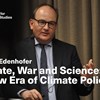allting
From Categories to Categorization: A Social Perspective on Market Categorization
Research in the Sociology of Organizations, Volume 51, 2017 Abstract The popularity of research into categories has grown in recent decades and shows no sign of abating. This introductory article takes

Ottmar Edenhofer: A New Era of Climate Policy
Research seminar with Ottmar Edenhofer, who is Director and Chief Economist of the Potsdam Institute for Climate Impact Research as well as Director of the Mercator Research Institute on Global Common
Ottmar Edenhofer: Climate, War and Science. Practical Dilemmas, Theoretical Challenges and a New Era of Climate Policy
Venue: Institutet för framtidsstudier, Holländargatan 13 , 4th floor in Stockholm, and online REGISTER >Research seminar with Ottmar Edenhofer, who is Director and Chief Economist of the Potsdam InstAbstractStarting by stating the current status quo of climate change, the talk focuses on the practical dilemmas an ambitious climate policy is facing, also on the grounds of the theoretical challenges involved. The present geopolitical global situation is calling for a new era of climate policy. But how do we get there?
Completed: Tipping Point
A multiartistic performative sculpture to visualize the complex connection between our decisions today and the living conditions for future generations.
Still heating: Unfolding a typology of climate obstruction
In N. Marschner, C. Richter, J. Patz, & A. Salheiser (Eds.), Contested climate justice – Challenged democracy: International perspectives (pp. 59-71). Campus Verlag GmbH Abstract Earth is on a catastryet, there is little sign of halting the rise of global greenhouse gas emissions orstopping the extraction of fossil fuels. Against this background, in this articlewe re-engage with a recently proposed typology supposed to cover three modesthrough which effective climate action has been obstructed. These are, first,primary obstruction, that is, the spread of disinformation and/or denying the veryexistence of anthropogenic climate change. Second, secondary obstruction concernsmore or less deliberate obstruction via opposition to climate action and policiesvia, for example, reference to “the threat of deindustrialisation”. Finally, tertiaryobstruction denotes modes of living which, while not necessarily obstructingeffective climate change intentionally, concerns “living in denial”. Drawing onrecent research and examples, we revisit this typology.
What Future for Europe? New Perspectives in Post-Industrial Fertility Issues
After years of falling fertility, most countries of the EU have reached stabilization; however, at very different levels across Europe. Examining this difference may help in understanding the underlyi
War Policies and Migration Aspirations in Russia
Delmi Report 2024:11 Summary This report investigates how migration aspirations within the Russian population have evolved following the full-scale invasion of Ukraine by Russia in 2022. It primarily fo
Birth Intervals and Health in Adulthood: A Comparison of Siblings Using Swedish Register Data
Demography, Volume 55, Issue 3, pp 929–955. Abstract A growing body of research has examined whether birth intervals influence perinatal outcomes and child health as well as long-term educational and s
Optimal Climate Policy and the Future of World Economic Development
World Bank Economic Review 33, 21-40 Abstract How much should the present generations sacrifice to reduce emissions today, in order to reduce the future harms of climate change? Within climate economics,
Incommensurability, the sequence argument, and the Pareto principle
Philosophical Studies Abstract Parfit (Theoria 82:110–127, 2016) responded to the Sequence Argument for the Repugnant Conclusion by introducing imprecise equality. However, Parfit’s notion of imprecise degrees of incommensurabilityeveryone








